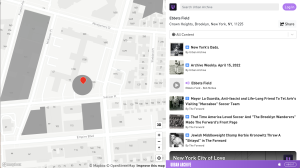The readings for this week’s Hyperlinked Community’s module reminded me that librarians don’t need to be experts on all content or resources we offer, but rather we need to be experts in drawing out the needs and interests of our customers and finding answers, details, and opportunities together. In reflection, I think that a hyperlinked library emphasizes networks of connections across library institutions and communities, internet, organizations; it allows each stakeholder to bring expertise and contribute to dynamic opportunities. In Asking the Right Questions, Aaron Schmidt reminds us of librarian’s responsibility to interpret customers’ interests into library services, not expect customers to reinvent libraries themselves (2016). I loved his example questions to pose to patrons instead of a generic request for feedback:
* What did you do this weekend?
* What is a hobby you wish you had more time for?
* Where do you like to travel? (Schmidt, 2016)
These questions really get to the heart of it for me. Libraries should respond to the context of our community and their needs/interests and librarians are responsible for providing channels of information about that context. Jean Fairbairn’s post “How a Modern Library Keeps Mothers Healthy in Rural Ghana” was such a powerful example of this. Maternal mortality issues are the contextual pressing issues, and the EIFL Public Library Innovation Programme (PLIP) in Ghana responded to this need for information by providing text alerts, videos, and supportive health reminders. The librarians themselves didn’t have to be experts in maternal health, but they were able to bring together community experts, tech experts, and mothers/prospective mothers to create a new information network (Fairbairn, 2013).
I’m realizing that understanding community contexts – social, emotional, political, and economic – through the eyes of our users (and our own!) experience is one of the most important mandates a librarian has. And we can’t do this alone! We need to call to action community members & partners, organizers, organizations, and service providers to create this.
The app and public history project, Urban Archive, is a fun example of an information network of libraries, museums, and family archives, that invites members of the public to engage with local history and contribute questions and personal ephemera. Urban Archive is a private company that provides a free, curated app program where libraries can make public their archives.

Archival content on Ebbets Field from Urban Archive NYC
I found my old address in NYC and found a rich list of digital media, interviews, and ephemera from NYPL and the NY Historical Society about Ebbets Field, Brooklyn Dogers’ Stadium, which was located there before my apartment complex. This discovery enriches my contextual experience of NYC and responds to my interest in public history!
References
Fairbairn, J. (2013). How a modern library keeps mothers healthy in Rural Ghana. Eifl. https://www.eifl.net/blogs/how-modern-library-keeps-mothers-healthy-rural-ghana
Schmidt, A. (2016, May 1). Asking the right questions. Library Journal, 141(8), 22. https://link-gale-com.libaccess.sjlibrary.org/apps/doc/A450998802/AONE?u=csusj&sid=bookmark-AONE&xid=b7dabb9d
Ebbets Field. Urban Archive. https://www.urbanarchive.org/sites/T71wqt68Cd6

@cedudley The NYC discoveries you made are so cool! I ❤️ partnerships such as this that helps collections and archives come to life.
Thanks @michael! There are so much dynamic and creative projects in NYC…I’m inspired to bring it to my small town